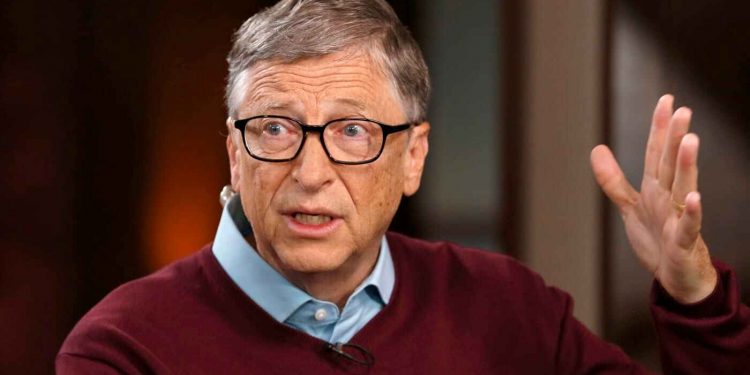Bill Gates, co-founder of Microsoft and co-chair of the Bill & Melinda Gates Foundation, has stated that Nigerians in particular should be enthusiastic about artificial intelligence (AI), particularly in the area of health advances and interventions.
The American business mogul claimed that instead of being concerned about AI, people should be delighted since it may hasten the discovery of new treatments for serious endemic diseases.
When he visited Nigeria, he spoke with a few handpicked journalists in Lagos and said this.
He had an earlier discussion with young African innovators and scientists at a Co-creation Hub and University of Lagos Business School event in Ikeja, Lagos.
Gates engaged with Nigerian inventors during the summit, which had the topic “Advancing Africa: Unleashing the Power of Youth in Science and Innovation,” and he urged them to identify possibilities in difficulties.
Gates highlighted that AI-driven advancements will aid poor countries, where the vast majority of under-five deaths are recorded, during the media engagement with six selected journalists in one of the conference rooms of the Marriott Hotel, Ikeja.
But he added, “We have to keep ahead to combat such threat. Like other technology, it may be abused by criminal elements. It’s great that people are becoming more aware of the negative effects of AI, but they also need to realise its immense potential.”
One of the foundation’s primary goals in AI, according to Gates, is to make sure it is applied to resolving urgent health issues that the world’s poorest people in low-income nations face.
He called artificial intelligence (AI) the most significant technological leap he had seen since the 1980s and urged governments and donors to establish incentives for businesses to share AI-generated insights into drugs and agriculture.
The business entrepreneur added that the only way to lessen the effects of climate change on agriculture is through innovation.
He stated that funds would be used to impact areas in terms of innovations and tools for the eradication and control of malaria.
He promised that the focus will continue on issues like nutrition, polio management, and eradication.
However, he asserted that these investments, particularly in the area of nutrition, should be reflected in these intervention points.
According to Gates, achieving financial inclusion and reducing poverty—especially in the country’s north—requires careful coordination between the government and the populace.
Speaking about vaccine production in Africa, the business tycoon claimed that tiny businesses shouldn’t take on such a project due to the costly trials required.
Gates continued, “It is a global thing governed by legislation, is complicated and may be extremely expensive.
Speaking further, he stated that there is no black market for the vaccinations that the foundation imported into the nation, adding that if they are not adequately implemented, particularly when it comes to routine immunisation, the shortcomings will become apparent over time.
“In the area of measles and malaria prevention. We observe outcomes and are satisfied with the financial decision,” he said.
He claimed his work time is divided into many categories to maintain an effective work schedule when asked how the Bill and Melinda Gates Foundation is able to keep track of the numerous intervention activities running concurrently around the world, particularly in Africa.
He added, “We have an incredible team that works with the government and partners to achieve the foundation’s agenda. I am surrounded by excellent teams.” They are morally upright individuals. We work with the best people.
The co-founder of Microsoft emphasised the need to address disparities in health, education, and financial services while also expressing faith in the ability of science and innovation to promote people’s long-term health.
“To do that, the people creating breakthroughs, funding them, and getting them into the world all need to prioritise equity,. They are going to prevent infectious diseases, provide life-saving interventions for mothers and babies; make food more nutritious, and give women more convenient contraception options. Down the road, AI will be applied to bring quality healthcare and education to more people.”
Gates expressed optimism at the AI’s potential to save and improve lives but said it can only happen if the motive is not profit-driven.
He said, “So, our foundation is thinking about what we can do to help AI develop in ways that improve the lives and well-being of everyone, not just the wealthiest people in a few rich countries.
“The foundation has issued a call for proposals or what we call a “Grand Challenge” for innovative, safe uses of large language models.
“We received 1,300 proposals, and half of them were from Africa. The winners will be announced in Senegal in October.
“We hope what emerges will help build an evidence base for advancing equitable outcomes in health and development everywhere in the world.”










